In this edition of Court Judgements, we look at the Supreme Court’s judgements on conviction for attempt to murder for simple injuries, differentiation between ‘basic wage’ and ‘minimum wage’, Madras High Court’s judgement on applicability of maternity benefit act, Bombay High Court’s judgement on SC/ST Act, Delhi High Court’s judgements on false allegations of dowry harassment and torture in marriages.
Supreme Court: Conviction for attempted murder can be upheld even if the injuries inflicted on the victim were minor/simple in nature.
The apex court, in S. K. Khaja vs. The State of Maharashtra held that just because the injuries caused were simple in nature, it would not absolve the accused from the conviction. The intention coupled with the overt act is of primary importance in such cases.
The two-judge bench comprising of Justice Bela M. Trivedi and Justice Dipankar Datta was hearing an appeal against the judgement of the Bombay High Court that dismissed the appeal and upheld the conviction passed by the Additional Sessions Judge. The accused was convicted under Sections 307 and 332 of IPC and was directed to undergo rigorous imprisonment for five years and two years for the said offences respectively.
While the counsel for the appellant argued that even if the case was proved to be against the appellant, the injuries were very simple in nature and would not attract offence under Section 307 of the IPC, urging to take a sympathetic view. It was vehemently opposed by the Counsel for the respondent and appealed that this court should not interfere with the impugned judgment and order of the High Court.
Hearing both sides, the apex court agreed with the views of the respondent, and the court remarked that merely because the injuries sustained were simple in nature, it would not absolve the accused of conviction.
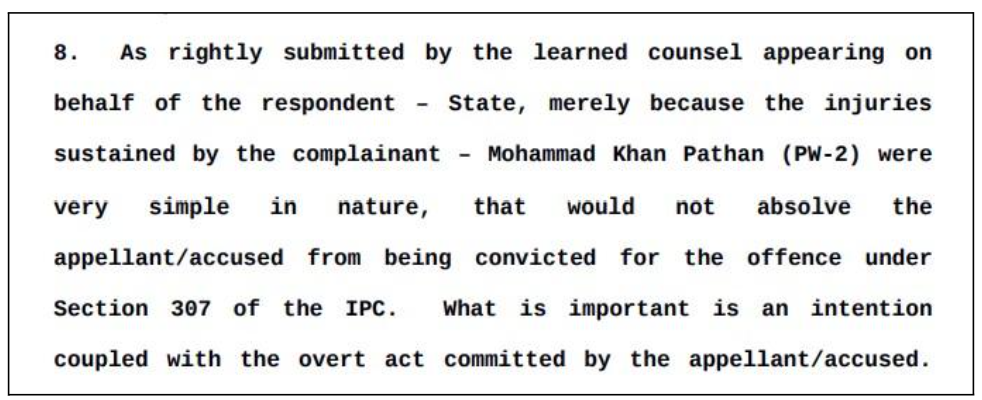
The court further remarked that it was not inclined to take any lenient view and reduce the punishment rendered by the trial court. Accordingly, the appeal is dismissed.
Supreme Court: The ‘basic wage’ as defined in the EPF Act should not be confused with the concept of ‘minimum wage’ as specified in the Minimum Wages Act.
In Assistant Provident Fund Commissioner vs. M/S G4S Security Services India Ltd & Anr., the apex court held that there was no necessity to take an expansive connotation to the words ‘basic wage’, particularly when it is defined under section 2(b) of the EPF Act, 1952.
The two-judge bench of the apex court comprising of Justice Hima Kohli and Justice Rajesh Bindal was hearing an appeal against the judgement of the Punjab and Haryana High Court that dismissed the writ petition by the appellant (in this case, Assistant Provident Fund Commissioner).
In the case at hand, the appellant raised a fundamental contention. Their argument revolved around the employer, who served as the respondent in the appeal, allegedly engaging in a questionable practice when determining the contribution to be made towards the provident fund. According to the appellant, the employer had inappropriately divided the wage structure and, in doing so, designated the reduced wage as the basic wage. This practice amounted to an endeavour to circumvent the payment of the correct and legally mandated sum towards the provident fund. However, the Appellate Tribunal, as well as the single bench and division bench of the High Court, dismissed the appellant’s argument.
Upon hearing both sides, the apex court also agreed with the position taken by the Punjab and Haryana High Court.
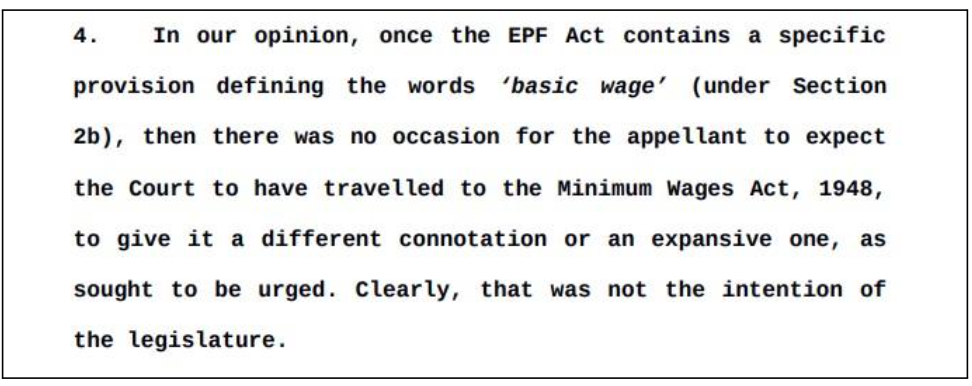
The court further remarked that there was no compulsion to hold the definition of ‘basic wage’ to be equated with the definition of ‘minimum wage’ under the Minimum Wages Act, 1948. Accordingly, the appeal is dismissed.
Madras HC: Maternity Benefit Act 1961 not applicable to Tamil Nadu Government Servants as they are governed by the Tamil Nadu Government Fundamental Rules and not the Maternity Benefits Act 1961.
The Madras High Court, in Tmt. M. Nithya vs. The Headmaster and Others held that when the policy of state government restricts the benefits of maternity leave, the petitioners cannot seek a benefit on the grounds of the Maternity Benefit Act, 1961. The court noted that in situations where the State policy imposes restrictions, employees in such circumstances cannot claim maternity leave for a third child.
The Single Judge bench comprising of Justice N. Satish Kumar was hearing a petition filed by a secondary grade teacher against the order passed by the Block Educational Officer who rejected her plea for maternity leave. The petitioner argued that the Maternity Benefit Act 1961 is a social welfare legislation aimed to provide social and economic justice to its citizens and it does not impose any restrictions on the maternity benefit. Accordingly, any imposition of restrictions such as two-child norm is not correct until the Maternity Benefit Act is suitably amended.
The counsel for respondents argued that the maternity benefits for them are regulated by Fundamental Rule 101(a), and the Maternity Benefit Act of 1961 does not apply in this context.
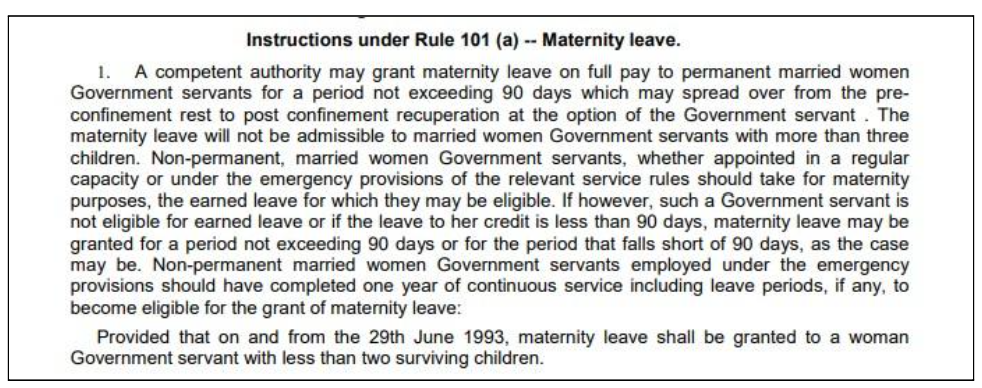
The question before the court is whether the petitioner qualifies for maternity leave benefits for a third child, particularly when both the earlier children were born prior to joining Government Service and whether the Maternity Benefit Act of 1961 is applicable to government employees.
The court looked at the Fundamental rules as well as the definition of ‘Establishment’ under the Maternity Benefit Act. The court remarked that the fundamental Rules explicitly state that this benefit is applicable to married women only up to the point of having two surviving children, and the petitioner, being a government employee not employed in any establishment defined by the Maternity Benefit Act of 1961, is not entitled to any benefits under this act. Instead, her entitlement is exclusively governed by the Fundamental Rules. The Court relied on the judgement of division bench in The Government of Tamil Nadu vs. K. Umadevi, wherein the court observed that,
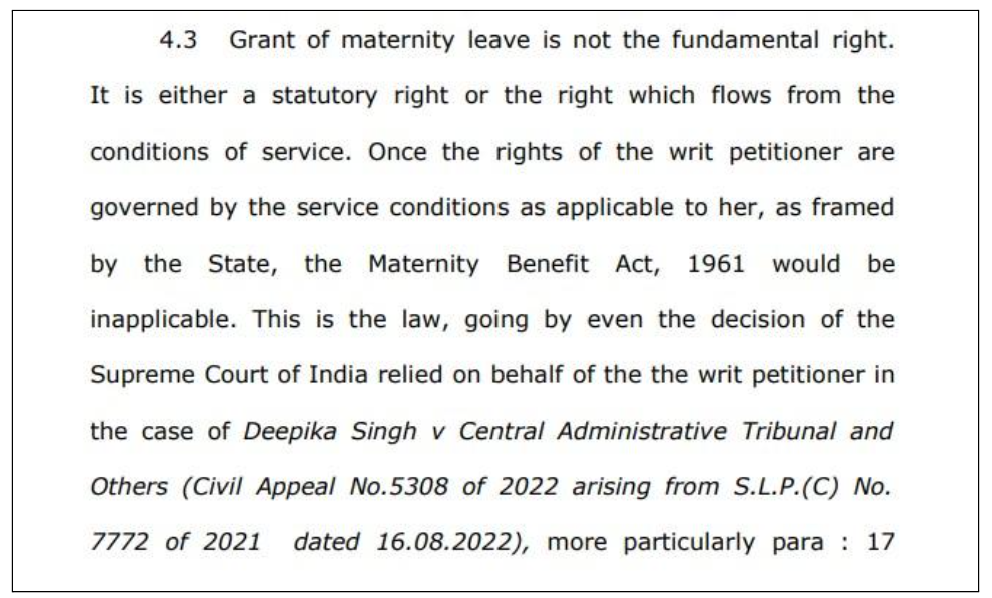
The court also looked at an important judgement of the apex court in Deepika Singh vs. Central Administrative Tribunal and OthersEditSign, where the apex court granted maternity leave to a third child. The Supreme Court has granted this benefit primarily because the appellant’s spouse had two biological children from his previous marriage, and this does not encroach upon the appellant’s right to utilize maternity leave for her own biological child. This was not applicable in the present case.
Based on the above facts, the Court holds the opinion that the petitioner cannot assert an automatic entitlement to maternity leave based on the Maternity Benefit Act. Accordingly, the petition is dismissed.
Bombay HC: Scope of SC/ST Act, 1989 is not restricted to states/UTs where they are declared as SC/STs, it is applicable in any part of the country where the offence is committed.
In Sanjay Katkar vs. State of Maharashtra, the Bombay High Court held that geographical restrictions on social reformatory legislation such as The Scheduled Castes and the Scheduled Tribes (Prevention of Atrocities) Act, 1989 is misplaced and the bar of the territorial arena cannot be applied to protect their existence and identity.
The full bench of the High Court comprising of Justice Revati Mohite Dere, Justice NJ Jamadar, and Justice Bharati Dangre were hearing a matter referred to them by the single judge bench regarding the territorial limits for protection under the said act, as well as the bench composition for deciding on the appeals under Section 14-A of the act. On the question of appeals, the High Court remarked that appeals under Section 14-A (2) would lie before the Single Judge of the High Court.
On the issue of territorial restrictions for protection under this act, the counsels presented different arguments. One such argument put forth was about the interpretation of a penal statute. according to him, the Atrocities Act shall be reasonably construed, as applicable only to the “Scheduled Castes” and “Scheduled Tribes”, within the State, in which they are so and not in any other State to which they migrate.
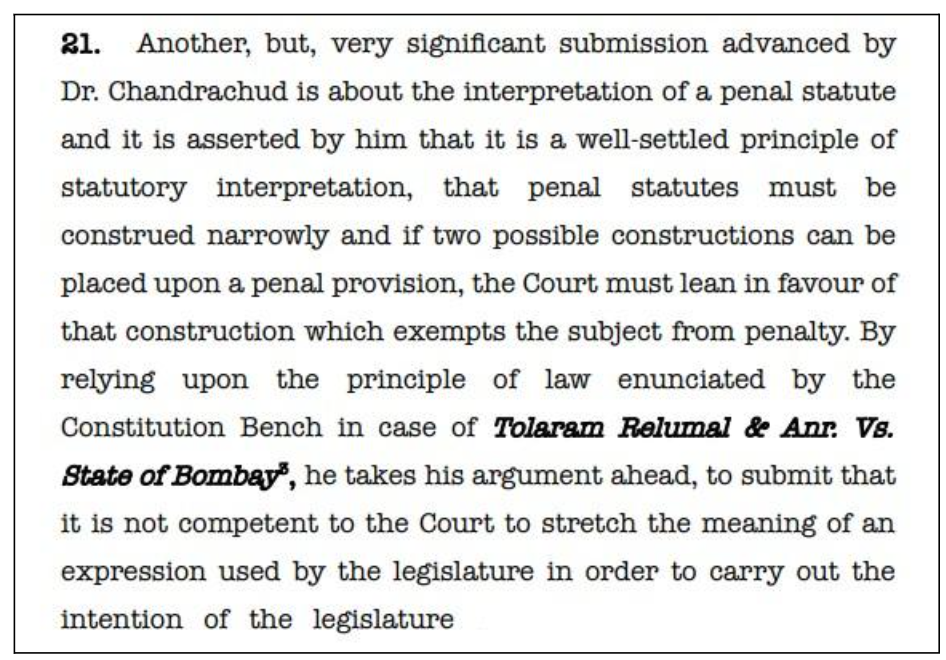
The learned Advocate General presented a distinct perspective in which he contended that even when dealing with penal statutes, the Atrocities Act should be understood within the context of its historical background. He argued that the interpretation of the provisions within this statute should align with the law’s purpose and consider the harm it aimed to prevent. This perspective was supported by other counsels as well.
Upon hearing both sides, the court found force in the arguments put forward by the Advocate General.
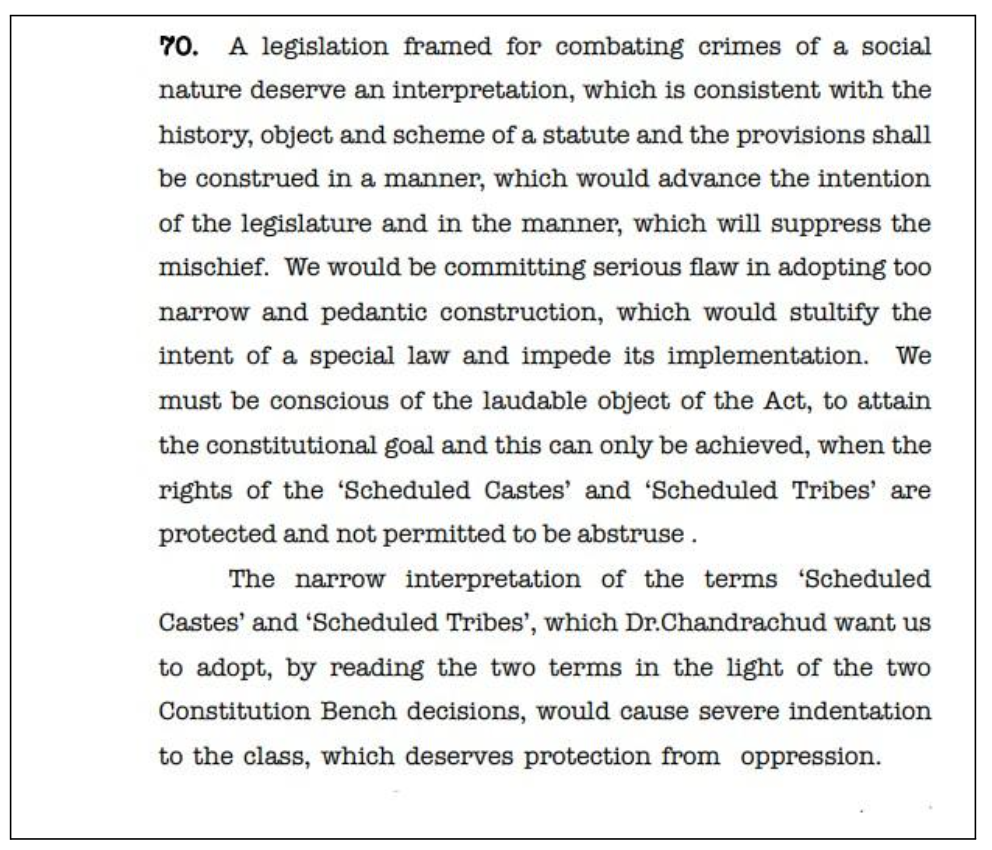
Accordingly, the court held that such special acts require an interpretation, which would attain the purpose and not defeat it. By restricting the identity of a Scheduled Caste or Scheduled Tribe only in relation to the State of his origin, it would cause more harm to the identified class than advancing them to compete with members of the higher class and assisting them in achieving equality, as enshrined in the Constitution.
Accordingly, the petition is disposed.
Delhi HC: Mere existence of marital relationship does not confer any law or right to subject his wife to torture.
In Appellant vs. Respondent, the Delhi High Court held that the husband has no right to put his wife to torture and beating merely because they are married.
The two-judge bench comprising of Justice Suresh Kumar Kait and Justice Neena Bansal Krishna was hearing an appeal filed by the wife against the dismissal of an earlier petition for divorce on grounds of desertion and cruelty. The wife, in her testimony, deposed that She endured dowry demands, and harassment, and suffered physical abuse and torture on multiple occasions. However, the family court rejected her application as her claims could not be substantiated.
However, the High Court took a different view. While it is factual that the evidence presented is solely the appellant’s testimony, without any examination of other family members, it’s essential to note that her testimony remains unchallenged. Given the absence of any counterargument from the respondent, it must be acknowledged that her account of physical assault is supported by the medical records. It was also supported by an FIR that was registered, further supporting claims of assault. The court further remarked that,

Accordingly, the appeal is allowed and the marriage between the appellant and the respondent is dissolved.
Delhi HC: False allegations of dowry harassment and rape against the family members of husband amounts to extreme cruelty.
The Delhi High Court, in A vs. S, held that making false and serious allegations of not only dowry harassment but also rape against the family members of the husband is an act of extreme cruelty and there is no condonation for such a cruel act.
The two-judge bench comprising of Justice Suresh Kumar Kait and Justice Neena Bansal Krishna was hearing an appeal by the wife against the judgement in which the husband’s petition for divorce on grounds of cruelty had been allowed and the marriage was dissolved. The brief facts of the case are as follows.
The parties entered into matrimony on 24 November 2012, in accordance with Hindu customs and rituals. However, for various reasons claimed by both parties, the appellant’s wife left the marital home on 19 February 2014. The respondent testified that the appellant had prevented the consummation of their marriage on 25 November 2012, and subsequently, she resisted any attempts at establishing a sexual relationship, even resorting to physical aggression. The respondent’s statements revealed that the appellant consistently opposed his efforts to engage in sexual intercourse and was consistently unwilling. Furthermore, the respondent himself mentioned that he had urged the appellant to visit a doctor because they were not able to conceive. There was no concrete evidence to demonstrate that the marriage was not consummated, but there was substantial proof indicating the appellant’s reluctance to engage in sexual relations. Further, the couple has barely been able to live together and have not been able to sustain their matrimonial relationship.
Upon looking at the facts of the case, the court observed that cohabitation is a necessary element for the sustenance of marriage. It relied on the apex court’s judgement in Vinita Saxena vs. Pankaj Pandit, wherein it was held that:

Further, the court remarked that bedrock of any matrimonial relationship is cohabitation and conjugal relationship. For a couple to be deprived of each other’s company, proves that the marriage cannot survive, and such deprivation of conjugal relationship is an act of extreme cruelty.
On the question of false allegations, the court relied on the judgement of the apex court in K. Srinivas vs. K.Sunita, whereby it was held that even one false criminal complaint is sufficient to constitute matrimonial cruelty.
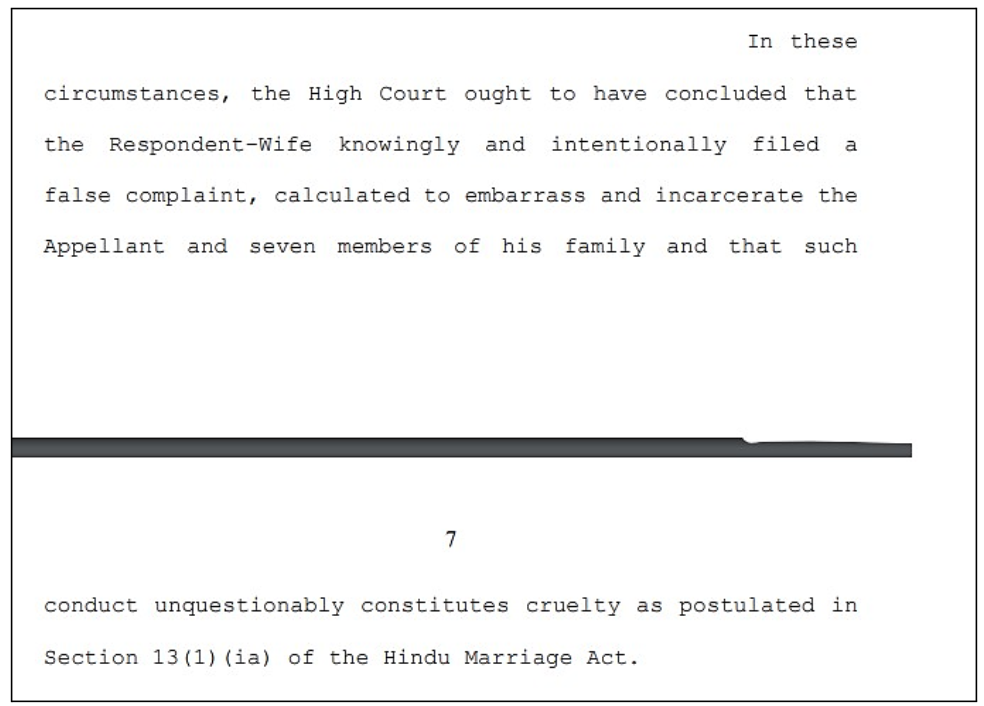
The High Court concluded that the Family Court has rightly concluded that the respondent was entitled to divorce on the ground of cruelty under Section 13(1)(ia) of the Hindu Marriage Act, 1955. Accordingly, the appeal is dismissed.


